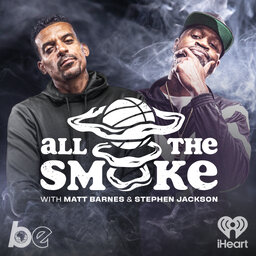Jeanie Buss | Ep 81 | ALL THE SMOKE Full Episode | SHOWTIME Basketball
ALL THE SMOKE is BACK. Owner and president of the Lakers, Jeanie Buss, joins the boys to talk all things purple and gold. Buss discusses the Showtime Lakers team & Magics retirement. Plus, she reflects on Kobe's impact and talks about Lebron's signing in 2018 & how it went down.
Learn more about your ad-choices at https://www.iheartpodcastnetwork.com
In 1 playlist(s)
All The Smoke
ALL THE SMOKE pairs two of the most outspoken and controversial players of their time. Known as fier…Social links
Follow podcast
Recent clips

Melvin Gregg: 7M Vine Followers, Snowfall’s Coldest Villain & Platform Shadow Bans
54:48

How to DESTROY a Franchise: Mad Max & Matt Barnes on Kings, Bucks & NFL Chaos
1:01:06

Vic Mensa Unfiltered: Chicago, ICE, Kanye & the Lies We’re Fed
1:09:11
 All The Smoke
All The Smoke